《中考英语》初中英语语法知识—动词时态的分类汇编
中考时态知识点归纳
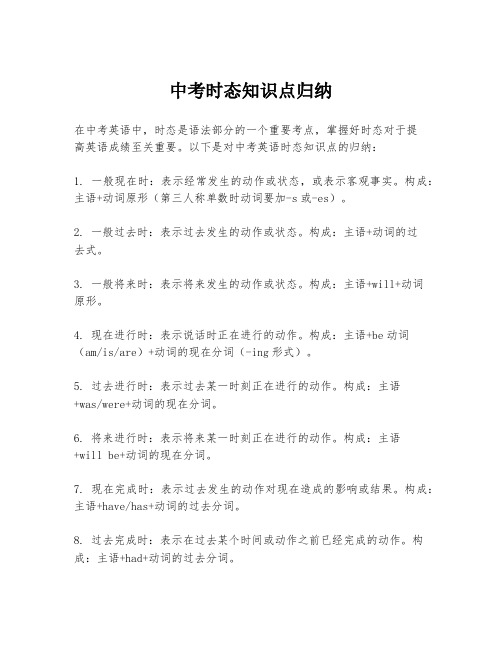
中考时态知识点归纳在中考英语中,时态是语法部分的一个重要考点,掌握好时态对于提高英语成绩至关重要。
以下是对中考英语时态知识点的归纳:1. 一般现在时:表示经常发生的动作或状态,或表示客观事实。
构成:主语+动词原形(第三人称单数时动词要加-s或-es)。
2. 一般过去时:表示过去发生的动作或状态。
构成:主语+动词的过去式。
3. 一般将来时:表示将来发生的动作或状态。
构成:主语+will+动词原形。
4. 现在进行时:表示说话时正在进行的动作。
构成:主语+be动词(am/is/are)+动词的现在分词(-ing形式)。
5. 过去进行时:表示过去某一时刻正在进行的动作。
构成:主语+was/were+动词的现在分词。
6. 将来进行时:表示将来某一时刻正在进行的动作。
构成:主语+will be+动词的现在分词。
7. 现在完成时:表示过去发生的动作对现在造成的影响或结果。
构成:主语+have/has+动词的过去分词。
8. 过去完成时:表示在过去某个时间或动作之前已经完成的动作。
构成:主语+had+动词的过去分词。
9. 将来完成时:表示将来某个时间之前已经完成的动作。
构成:主语+will have+动词的过去分词。
10. 现在完成进行时:表示从过去某一时间开始,一直持续到现在,并且可能还要继续下去的动作。
构成:主语+have/has been+动词的现在分词。
11. 过去完成进行时:表示在过去某一时间之前开始,一直持续到过去某一时间的动作。
构成:主语+had been+动词的现在分词。
12. 被动语态:表示动作的承受者而非执行者。
被动语态的构成根据时态不同而变化,一般形式为:be动词的各种时态形式+动词的过去分词。
掌握这些时态的构成和用法,对于理解和运用英语时态至关重要。
在复习时,可以通过做练习题、阅读例句和进行实际对话来加深理解。
同时,注意时态之间的转换和使用场合,以确保在中考中能够准确无误地使用各种时态。
结束语:通过上述的归纳,希望同学们能够对中考英语中的时态有一个清晰的认识和掌握,为中考取得优异成绩打下坚实的基础。
初中英语知识归纳总结——动词的时态

初中英语知识归纳总结——动词的时态动词的时态(一)教学重点一般现在时在英语中,不同时间里以不同方式发生的动作或存在的状态,要用不同的动词形式来表示,动词的这种不同形式称为动词的时态。
时态从时间上划分,可分为四大类:现在时;过去时;将来时;过去将来时。
从行为上,每一类可以分为四种形式:一般式;进行式;完成式;完成进行式。
这样英语的动词合起来,总共有十六种时态,初中只需掌握其中的八种时态。
1、一般现在时(1)一般现在时表示现在的状态、习惯性的动作或主语所具备的性格和能力等。
①当动词是be时,第一人称用am,第二人称用is,其他人称用are.②当动词是实义动词时,一般用动词原形,但如果主语是第三人称单数时,动词必须用第三人称单数形式,其变化规则如下:助动词do(第三人称单数用does)构成否定句、疑问句及答语,但要注意助动词后原来的谓语动词要恢复原形。
例如:I like music.I don’t like music.Do you like music?Yes, I do No, I don’t(2)一般现在时的用法①表示经常、习惯性动作,常和often, usually, every day, sometimes, always 等时间状语连用。
如:He goes to school by bus every day.They often play football②表示能力、职业、特征。
如:Miss Gao teaches English.Do you speak Japanese?③表示客观存在。
如:The earth moves round the sun.Time and tide wait for no man.④表示已经安排好或计划好的事。
如The plane takes off at 7:30.Classes begin at 8:00⑤在时间状语和条件状语从句中,主句用一般将来时,从句用一般现在时。
初中英语知识点归纳动词的不同时态与语态

初中英语知识点归纳动词的不同时态与语态动词的不同时态与语态是初中英语的重要知识点。
掌握了动词的时态和语态,我们就能更准确地表达过去、现在和将来的动作,以及主语对动作的不同态度。
下面是对初中英语中动词的不同时态与语态的归纳总结。
一、动词的时态1. 一般现在时一般现在时表示经常性或习惯性的动作、客观真理、固定事件等。
例句:- I go to school every day.(我每天去上学。
)- The sun rises in the east.(太阳从东方升起。
)2. 现在进行时现在进行时表示现在正在进行的动作。
例句:- He is watching TV now.(他正在看电视。
)- They are playing basketball in the park.(他们正在公园里打篮球。
)3. 一般过去时一般过去时表示过去发生的动作或存在的状态。
例句:- We watched a movie last night.(昨晚我们看了一场电影。
)- She lived in Beijing when she was young.(她年轻时住在北京。
)4. 过去进行时过去进行时表示过去某个时间正在进行的动作。
例句:- They were having dinner at 7 o'clock yesterday.(昨天7点他们正在吃晚饭。
)- At this time last year, I was studying in London.(去年这个时间,我正在伦敦学习。
)5. 将来时将来时表示将要发生的动作或存在的状态。
例句:- We will go to the beach next week.(下周我们将去海滩。
)- She is going to visit her grandparents tomorrow.(她明天将要去看望她的祖父母。
)二、动词的语态1. 主动语态主动语态表示主语是动作的执行者。
中考中的动词时态知识点总结与归纳
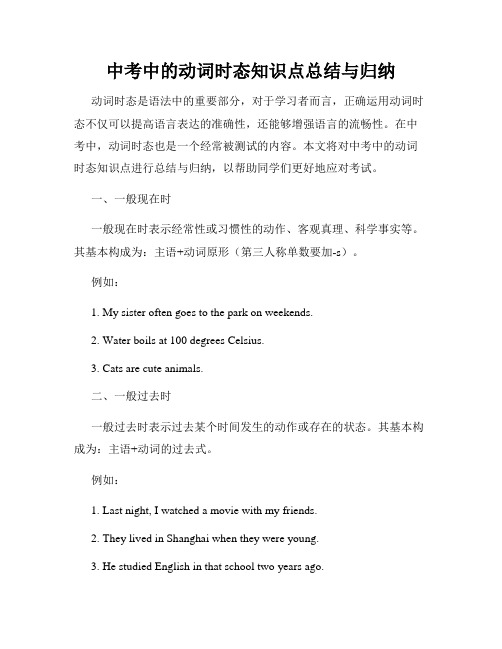
中考中的动词时态知识点总结与归纳动词时态是语法中的重要部分,对于学习者而言,正确运用动词时态不仅可以提高语言表达的准确性,还能够增强语言的流畅性。
在中考中,动词时态也是一个经常被测试的内容。
本文将对中考中的动词时态知识点进行总结与归纳,以帮助同学们更好地应对考试。
一、一般现在时一般现在时表示经常性或习惯性的动作、客观真理、科学事实等。
其基本构成为:主语+动词原形(第三人称单数要加-s)。
例如:1. My sister often goes to the park on weekends.2. Water boils at 100 degrees Celsius.3. Cats are cute animals.二、一般过去时一般过去时表示过去某个时间发生的动作或存在的状态。
其基本构成为:主语+动词的过去式。
例如:1. Last night, I watched a movie with my friends.2. They lived in Shanghai when they were young.3. He studied English in that school two years ago.三、一般将来时一般将来时表示将来某个时间要发生的动作或存在的状态。
其基本构成为:主语+will/shall+动词原形。
例如:1. I will go to Beijing next week.2. She will study hard for the exam.3. They shall visit their grandparents during the summer vacation.四、现在进行时现在进行时表示现在正在进行的动作。
其基本构成为:主语+am/is/are+动词-ing。
例如:1. We are having dinner.2. He is playing basketball in the park.3. They are studying for the test.五、过去进行时过去进行时表示过去某个时间正在进行的动作。
2024中考英语语法必考知识点总结

2024中考英语语法必考知识点总结一、时态1.一般现在时:表经常性的动作、习惯或客观事实。
2.一般过去时:表示过去发生、结束的动作或状态。
3.一般将来时:表示将来一些时间要发生的动作。
4.现在进行时:表示现在正在进行的动作。
5.过去进行时:表示过去其中一时刻或一段时间内正在进行的动作。
6.现在完成时:表示过去发生并与现在有关的动作或状态。
7.过去完成时:表示过去其中一动作或状态发生在另一过去动作或状态之前。
8. 一般将来时(be going to):表示将要、准备或打算做事。
二、被动语态1. 被动语态的构成:be + 过去分词2.主动语态和被动语态的转换:将主动语态的宾语变为主语,同时动词的形式改为被动语态的形式。
三、虚拟语气1.If从句中的虚拟语气:a)If从句表示与事实相反的情况,主句用过去将来时。
b)If从句表示与现在事实相反的情况,主句用过去时。
c) If从句表示与过去事实相反的情况,主句要用“had + 过去分词”。
2.虚拟条件句的其他情况:a) 与现在相反:as if, though, even if等引导的条件句,主句用过去时。
b)与将来相反:引导条件状语从句的主将从现,主句用过去时。
c)与过去相反:引导条件状语从句的主将从现,主句用过去完成时。
四、宾语从句1.宾语从句:在句子中作宾语的从句。
2.宾语从句的时态:按照实际情况使用时态。
3. 宾语从句的连接词:that, whether, if等。
五、定语从句1. 定语从句的构成:关系词(who, whom, whose, which, that)+句子。
2. 指物的定语从句:关系代词用which或that,在从句中充当主语、宾语或定语。
3. 指人的定语从句:关系代词用who或that,在从句中充当主语或宾语;关系代词用whom或that,在从句中充当宾语。
4. 定语从句的连接词从句中的位置:连接词(who, whom, which, that, whose)在从句中充当成分的位置。
中考语法知识点归纳动词时态语态与非谓语动词
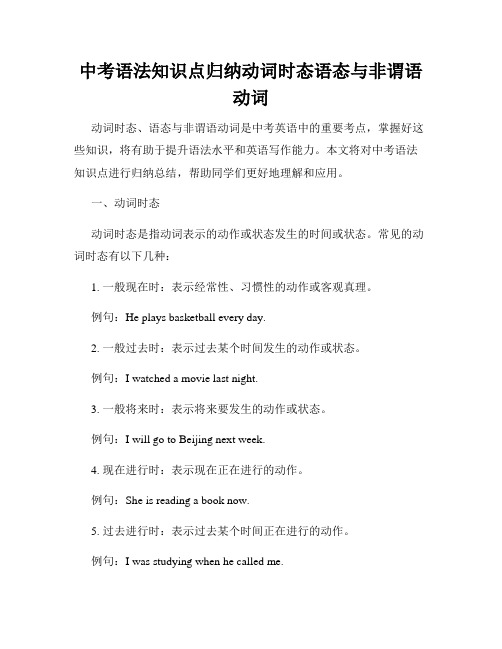
中考语法知识点归纳动词时态语态与非谓语动词动词时态、语态与非谓语动词是中考英语中的重要考点,掌握好这些知识,将有助于提升语法水平和英语写作能力。
本文将对中考语法知识点进行归纳总结,帮助同学们更好地理解和应用。
一、动词时态动词时态是指动词表示的动作或状态发生的时间或状态。
常见的动词时态有以下几种:1. 一般现在时:表示经常性、习惯性的动作或客观真理。
例句:He plays basketball every day.2. 一般过去时:表示过去某个时间发生的动作或状态。
例句:I watched a movie last night.3. 一般将来时:表示将来要发生的动作或状态。
例句:I will go to Beijing next week.4. 现在进行时:表示现在正在进行的动作。
例句:She is reading a book now.5. 过去进行时:表示过去某个时间正在进行的动作。
例句:I was studying when he called me.6. 现在完成时:表示过去的动作对现在造成的影响或结果。
例句:She has visited Paris three times.7. 过去完成时:表示对过去某个时间之前发生的动作进行的描述。
例句:They had already left when I arrived.二、动词语态动词语态是指动作发出的主体和动作所受的影响关系。
英语中常见的动词语态有以下几种:1. 主动语态:表示主语是动作的发出者。
例句:He fixed the car yesterday.2. 被动语态:表示主语是动作的承受者。
例句:The car was fixed by him yesterday.3. 进行时态:表示主语正在进行的动作处于进行状态。
例句:The book is being read by her.4. 完成时态:表示主语已经完成的动作处于完成状态。
例句:The book has been read by her.注意:被动语态需要根据动作的时态来变换,同时需要适当更改时态动词。
初中英语中考必考的八种时态知识汇总(附常用动名词结构)

初中英语中考必考的八种时态知识汇总(附常用动名词结构)一、一般现在时概念:经常、反复发生的动作或行为及现在的某种状况。
时间状语:always, usually, often, sometimes, every week (day,year, month…), once a week, on Sundays, etc.基本结构:①be动词;②行为动词否定形式:①am/is/are+not;②此时态的谓语动词若为行为动词,则在其前加don't,如主语为第三人称单数,则用doesn't,同时还原行为动词。
一般疑问句:①把be动词放于句首;②用助动词do提问,如主语为第三人称单数,则用does,同时,还原行为动词。
二、一般过去时概念:过去某个时间里发生的动作或状态;过去习惯性、经常性的动作、行为。
时间状语:ago, yesterday, the day before yesterday, lastweek(year, night, month…), in 1989, just now, at the age of 5, one day, longlong ago, once upon a time, etc.基本结构:①be动词;②行为动词否定形式:①was/were+not;②在行为动词前加didn't,同时还原行为动词。
一般疑问句:①was或were放于句首;②用助动词do 的过去式did 提问,同时还原行为动词。
三、现在进行时概念:表示现阶段或说话时正在进行的动作及行为。
时间状语:now, at this time, these days, etc.基本结构:am/is/are+doing否定形式:am/is/are+not+doing.一般疑问句:把be动词放于句首。
四、过去进行时概念:表示过去某段时间或某一时刻正在发生或进行的行为或动作。
时间状语:at this time yesterday, at that time或以when 引导的谓语动词是一般过去时的时间状语等。
中考英语-动词时态整理动词时态整理课件

•关键词:动词 的过去式
过去式
• need-needed • laugh-laughed • carry-carried • cry-cried • stop-stopped • like-liked
• prefer- preferred
• be-was/were • say-said • see-saw • have-had • forget-forgot • know-knew • catch-caught
请务必注意
动词第三人称 单数哦!
一般在动词尾加s
like-likes jump-jumps leave-leaves 动w词r第ite三-w人r称it单es数 play-plays say- says
以ch,sh,s, o, x 结尾的 动词后加es
• catch-catches go-goes • finish-finishes • teach-teaches do-does • wash-washes • pass- passes have- has
态
《中考说明》指出:
一般现在时
六 一般过去时
种 一般将来时
时 现在进行时
态
过去进行时
现在完成时
一般现在时
simple present tense
一般现在时用法
习惯活动和 1.I get up at six every morning.
爱好
2.She likes pop music.
现在情况
1.They are very busy. 2.He needs help.
一般将来时
simple future tense
英语中考归纳复习专题:动词的时态
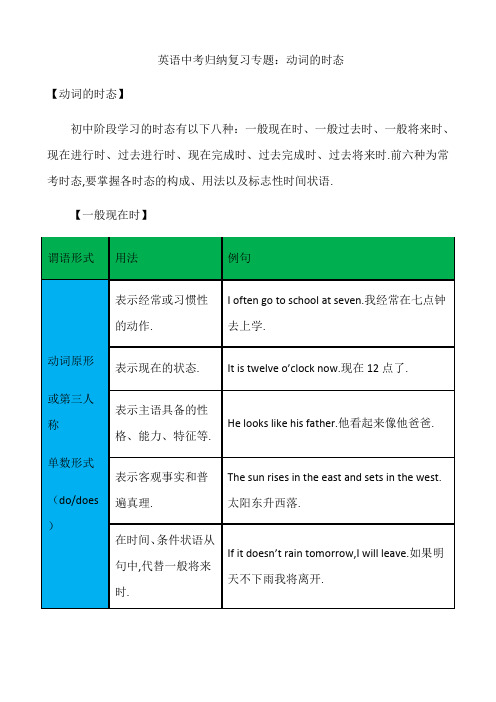
英语中考归纳复习专题:动词的时态【动词的时态】初中阶段学习的时态有以下八种:一般现在时、一般过去时、一般将来时、现在进行时、过去进行时、现在完成时、过去完成时、过去将来时.前六种为常考时态,要掌握各时态的构成、用法以及标志性时间状语.【一般现在时】【考点训练1】1.My father is a teacher and he _________ (teach) in a middle school.2.Yesterday the teacher told us the earth _______ (go) around the sun.3.—When shall we begin our meeting?—We’ll begin it when Helen ___ . ()esB.cameC.will comee4.—How do you usually go to school?—I usually ___ to school on foot. ()A.goB.wentC.was goingD.will go答案:teaches goes A A【一般过去时】要点提醒:“used to+动词原形”表示过去的习惯或状态.如:Mum used to tell us stories.妈妈过去常给我们讲故事.【考点训练2】1.Mike ________ (not go) to bed until 12 o’clock last night.2.He asked if I _____ (be) a student.3.Will you please say it again?I ___ quite ___ you.()A.don’t;hearB.didn’t;hearC.don’t;heardD.didn’t;heard4.He _____ go out with his parents,but now he ____ staying at home alone. ()ed to;is used toB.is used to;used toe to;is used toed to;used to答案:didn’t go was B A【一般将来时】要点提醒:be going to与will的区别1.be going to 指已计划好的事或思考过的意图、打算,will表示未事先思考或未计划而临时做出的决定.如:I’m going to see him tomorrow.我打算明天去看他.(事先经过思考)I’ll answer the door.我去开门.(未经事先考虑)2.be going to可表示客观迹象表明马上要发生的事,而will则表明说话者的主观意愿.如:Look at the clouds.There is going to be a storm.看看这些云,暴风雨就要来了.(客观迹象表明要发生)I hope it will be warm tomorrow.我希望明天会暖和起来.(主观意愿)3.在含有条件状语从句的复合句的主句中,一般用will,不用be going to. 如:I will come if it doesn’t rain.如果不下雨的话,我就来.【考点训练3】1.____ a concert in our school next Saturday. ()A.There isB.There areC.There will beD.There will have2.If they can arrive by 9:00 am,we ___ a meeting.()A.haveB.will haveC.hadD.would have3.He ___ her a beautiful hat on her next birthday.()A.givesB.gaveC.will givingD.is going to give答案:C B D 【现在进行时】【考点训练4】1.They ____________ (have) a math test in the classroom now.2.Look! He ___________ (lie) on the beach.3.—Pass the raincoat to me.It ___ hard now.—Here you are. ()A.rainB.is rainingC.rainedD.will rain4.—Cathy,can you answer the door?I ___ the room.—I’m coming,Mum. ()A.CleanB.cleanedC.have cleanedD.am cleaning答案:are having is lying B D【过去进行时】He was forever com plaining about something.他老是怨这怨那.要点提醒:1.在含有时间状语从句的复合句中,延续时间较长的动作常用过去进行时,另一个短暂性动作用一般过去时.如:When the UFO landed,I was shopping at the clothes store.当UFO落地时,我正在服装店买衣服.2.表示两个延续性动作在过去某一时刻同时进行,不考虑动作的先后顺序,主句和从句的谓语动词都用过去进行时,连词常用while.如:Tom was doing his homework while I was reading a newspaper.我在看报纸时,汤姆在做作业.【考点训练5】1.Mike and I ___________ (play) basketball at that time yesterday afternoon.2.While Mr.Johnson _______________ (work) in the office,the phone rang.3.The girl ___ for the bus when the rainstorm came.()A.waitedB.have waitedC.is waitingD.was waiting4.—Jenny,I called you at nine last night,but you didn’t pick up.—Oh,I ____ a popular program called Go Fighting!.()A.watchB.watchedC.was watchingD.am watching答案:were playing was working D C【现在完成时】要点提醒:1.have/has been to,have/has gone to与have/has been in(考点讲解详见P74考点1)2.延续性动词与非延续性动词英语中的动词按动作发生的方式、发生过程的长短可分为延续性动词和非延续性动词两种,非延续性动词也可称为短暂性动词或瞬间动词.在现在完成时态中,有时要将非延续性动词转换为延续性动词,这样才能和时间段连用.转换方法如下:(1)将短暂性动词转换为“be+形容词或副词”.请看下表:如:这间商店开门6小时了.The shop has opened for 6 hours.( ×)The shop has been open for 6 hours.( √)(2)有的短暂性动词可以转换为意思相同的延续性动词.请看下表:如:这本书我借了一个月了.I have borrowed the book for one month.( ×)I have kept the book for one month.( √)3.现在完成时与一般过去时的区别现在完成时强调某一动作或状态对现在造成的影响或结果,不能和表示过去的时间状语连用;一般过去时只表示过去的事实,不表示和现在的关系,可以和表示过去的时间状语连用.如I bought a ticket yesterday.我昨天买了一张票.(强调我昨天做的一件事是买票)I have already bought a ticket.我已经买了一张票.(强调我已经有票了,无须再惦记票的事了)4.现在完成时的其他句型【考点训练6】1.—you _____ your homework yet?—Yes.I ______ it a moment ago. ()A.Did;do;finishedB.Have;done;finishedC.Have;done;have finishedD.Will;do;finish2.His father ___ the Party since 1978. ()A.joinedB.has joinedC.was inD.has been in3.Miss Green isn’t in the office.She to the library. ()A.has goneB.wentC.will goD.has been 答案:B D A【过去完成时】had + 过去分词表示在过去的过去发生的动作或存在的状态.I had had three pieces of cake when you arrived.你来的时候我已经吃了三块蛋糕了.表示过去某一动作或状态持续到过去另一时间.The old man had lived in Shanghai for ten years beforeTom came here.汤姆来这儿之前,这个老人已经住在上海十年了.时间标志by the time...,before,when等构成的短语或引导的从句【考点训练7】1.在我们到达电影院之前,电影已经开始了.The film __________ before we _______ to the cinema.2.警察赶到时,小偷已经逃跑了.When the police __________,the thief____________________ .答案:had begun got arrived had run away 【过去将来时】【考点训练8】1.李明说如果布莱恩下个月来中国,他将会很高兴.Li Ming said he ___________ happy if Brian came to China the next month.2.蒂娜说她下周三打算来参加我的生日派对.Tina said she ________________ my birthday party the next Wednesday.答案:would be was going to【中考示例】(2017·广西)If he _____ Guilin,he’ll probably go to Yangshuo. ( )A.visitsB.is visitingC.will visitD.has visited【解析】考查动词的时态.句意:如果他游览桂林,他有可能会去阳朔.if引导条件状语从句时,时态遵循“主将从现”原则,从句中用一般现在时表示将来.【考题热身】1.(2017·甘肃)I promise I ________ (send) you an email to explain all of these tomorrow.2.(2017·甘肃)Be quiet! The patients ______________(sleep).3.(2017·鄂州)Sandy’s grandparents__________________ (marry) for 50 years.4.(2017·台州改编)A true friend always ____________(support) you whenever youare in trouble.5.(2017·宿迁)I ______________(wash) the dishes while my sister was sweeping the floor.6.(2017·云南)—What do you think of your hometown, Kate?—It a lot.It’s more beautiful than before. ()A.has changedB.changesC.will changeD.change7.(2017·武汉)—Linda is not coming for the party tonight.—But she ______!()A.promisesB.promisedC.will promiseD.had promised8.(2017·毕节)It’s nice to see you again.We ___ each other since 2016. ()A.won’t seeB.haven’t seenC.don’t seeD.didn’t see9.(2017·黔东南)If it doesn’t rain this weekend,we ___ a picnic in the Jinquan Park. ()A.haveB.will haveC.have hadD.had10.(2017·上海)Some exchange students ___ with their host families this time yesterday. ()A.are chattingB.will chatC.were chattingD.have chatted11.(2017·重庆B卷)—Where is your uncle?I haven’t seen him for a long time. —He _____ Beijing for about half a year.He moved there in January. ()A.has gone to B.has been toC.has arrived inD.has been in12.(2017·重庆B卷)John and I ___ to visit his grandparents last Sunday afternoon. ()A.goB.wentC.will goD.have gone13.(2017·重庆A卷)In the past few years,many schools ____ the ways of doing morning exercises. ()A.changeB.changesC.will changeD.have changed14.(2017·重庆A卷)As soon as the rain _____ ,they will go out to pick apples. ()A.stopsB.stoppedC.will stopD.is stopping15.(2017·河北)Don’t take the dictionary away.I ___ it. ()eedC.am usingD.have used答案:will send are sleeping have been married supports A B BBCDBDAC。
初中英语语法总结动词的六种时态

初中英语语法总结动词的六种时态动词有六种时态:一般现在时、一般过去时、一般将来时、现在进行时、过去进行时和将来进行时。
1. 一般现在时(Simple Present Tense):表示目前的状态、习惯、经常发生的事情或普遍真理。
-肯定句:主语+动词原形(第三人称单数形式加-s)- 否定句:主语+do(does)+not+动词原形- 疑问句:Do(Does)+主语+动词原形?2. 一般过去时(Simple Past Tense):表示过去发生的动作或状态。
-肯定句:主语+动词过去式- 否定句:主语+did+not+动词原形- 疑问句:Did+主语+动词原形?3. 一般将来时(Simple Future Tense):表示将来要发生的动作或情况。
- 肯定句:主语+will+动词原形- 否定句:主语+will+not+动词原形- 疑问句:Will+主语+动词原形?4. 现在进行时(Present Continuous Tense):表示当前正在进行的动作或情况。
- 肯定句:主语+am/is/are+动词-ing形式- 否定句:主语+am/is/are+not+动词-ing形式- 疑问句:Am/Is/Are+主语+动词-ing形式?5. 过去进行时(Past Continuous Tense):表示过去一些时间点正在进行的动作或情况。
- 肯定句:主语+was/were+动词-ing形式- 否定句:主语+was/were+not+动词-ing形式- 疑问句:Was/Were+主语+动词-ing形式?6. 将来进行时(Future Continuous Tense):表示将来一些时间点会继续进行的动作或情况。
- 肯定句:主语+will be+动词-ing形式- 否定句:主语+will not be+动词-ing形式- 疑问句:Will+主语+be+动词-ing形式?注意:动词的时态变化仅针对于一般动词,对于助动词、情态动词和不规则动词,变化规则可能会有所不同。
2024年中考英语复习专题初中英语语法六大时态总结
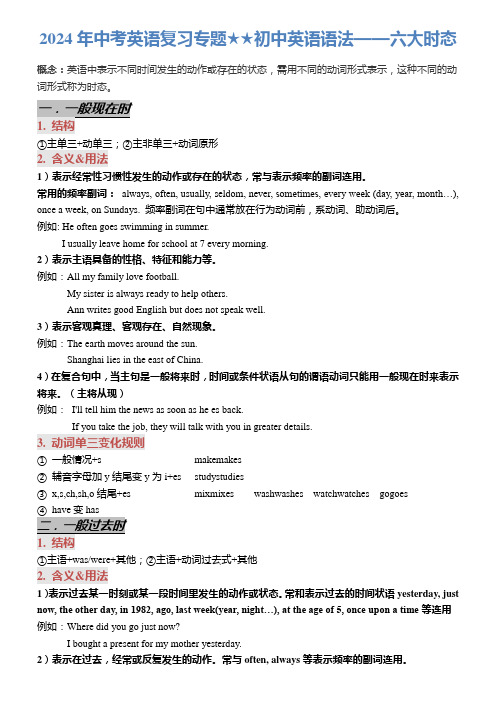
2024年中考英语复习专题★★初中英语语法——六大时态概念:英语中表示不同时间发生的动作或存在的状态,需用不同的动词形式表示,这种不同的动词形式称为时态。
一.一般现在时1. 结构①主单三+动单三;②主非单三+动词原形2. 含义&用法1)表示经常性习惯性发生的动作或存在的状态,常与表示频率的副词连用。
常用的频率副词:always, often, usually, seldom, never, sometimes, every week (day, year, month…), once a week, on Sundays. 频率副词在句中通常放在行为动词前,系动词、助动词后。
例如: He often goes swimming in summer.I usually leave home for school at 7 every morning.2)表示主语具备的性格、特征和能力等。
例如:All my family love football.My sister is always ready to help others.Ann writes good English but does not speak well.3)表示客观真理、客观存在、自然现象。
例如:The earth moves around the sun.Shanghai lies in the east of China.4)在复合句中,当主句是一般将来时,时间或条件状语从句的谓语动词只能用一般现在时来表示将来。
(主将从现)例如:I'll tell him the news as soon as he es back.If you take the job, they will talk with you in greater details.3. 动词单三变化规则①一般情况+s makemakes②辅音字母加y结尾变y为i+es studystudies③x,s,ch,sh,o结尾+es mixmixes washwashes watchwatches gogoes④have变has二.一般过去时1. 结构①主语+was/were+其他;②主语+动词过去式+其他2. 含义&用法1)表示过去某一时刻或某一段时间里发生的动作或状态。
中考时态知识点总结
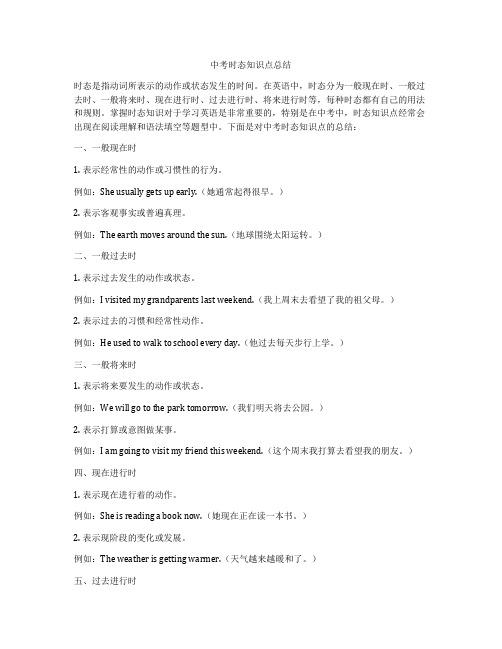
中考时态知识点总结时态是指动词所表示的动作或状态发生的时间。
在英语中,时态分为一般现在时、一般过去时、一般将来时、现在进行时、过去进行时、将来进行时等,每种时态都有自己的用法和规则。
掌握时态知识对于学习英语是非常重要的,特别是在中考中,时态知识点经常会出现在阅读理解和语法填空等题型中。
下面是对中考时态知识点的总结:一、一般现在时1. 表示经常性的动作或习惯性的行为。
例如:She usually gets up early.(她通常起得很早。
)2. 表示客观事实或普遍真理。
例如:The earth moves around the sun.(地球围绕太阳运转。
)二、一般过去时1. 表示过去发生的动作或状态。
例如:I visited my grandparents last weekend.(我上周末去看望了我的祖父母。
)2. 表示过去的习惯和经常性动作。
例如:He used to walk to school every day.(他过去每天步行上学。
)三、一般将来时1. 表示将来要发生的动作或状态。
例如:We will go to the park tomorrow.(我们明天将去公园。
)2. 表示打算或意图做某事。
例如:I am going to visit my friend this weekend.(这个周末我打算去看望我的朋友。
)四、现在进行时1. 表示现在进行着的动作。
例如:She is reading a book now.(她现在正在读一本书。
)2. 表示现阶段的变化或发展。
例如:The weather is getting warmer.(天气越来越暖和了。
)五、过去进行时1. 表示在过去某个时间点正在进行的动作。
例如:They were playing basketball at 5 o'clock yesterday.(昨天下午5点他们正在打篮球。
)2. 表示过去某个时间段内反复发生的动作。
中考英语复习之动词分类、时态

中考英语复习之动词分类、时态一、考点、热点回顾动词的分类和时态(一)、知识概要动词是语言中必不可少的一部分,主要有助动词、情态动词、be动词、使役动词、系动词等不同动词形式。
如助动词do、have等;情态动词will、may、can、must等;使役动词work、play、study等;系动词feel、look、sound、taste等。
初中英语不规则动词变化表I.A-B-B型变化原形过去式过去分词基本含义Verb past Tense Past Participle Basic Meaningbring brought brought 带来,引起,产生buy bought bought 购买;采购catch caught caught 接住;抓住;赶上;染上dig dug dug 挖(士);掘J(地)feel felt felt 触摸(某物);感觉到fight fought fought 搏斗;奋斗;斗争;争论find found found 查明;找到;感到get got got 达到;接到;得到;经受have had had 有;吃;喝;进行;经受hear heard heard 听见;听说;得知hold held held 拿住;抓住;抱;举行keep kept kept 留下;保留;继续leave left left 离开;把……留下;剩下learn learnt/learned learnt/learned 学;学习;获悉;得知lend lent lent 借出;供给lose lost lost 失去;丧失;损失make made made 做;制作;制造;使得meet met met 遇见;碰见(某人)pay paid paid 付钱,给…报酬say said said 说,讲sell sold sold 卖,销售shine shone shone 发光,照耀,照射shined shined 擦亮sit sat sat 坐,就座sleep slept slept 睡,睡觉,睡着smell smelt smelt 闻出,嗅,发气味spend spent spent 用(钱),花(时间),度stand stood stood 站立,起立,位于,经受teach taught taught 教,教授,传授tell told told 告诉,讲述,吩咐think thought thought 想,思考,认为understand understood understood 懂,理解,领会win won won 嬴,获胜。
初中英语动词时态知识点归纳
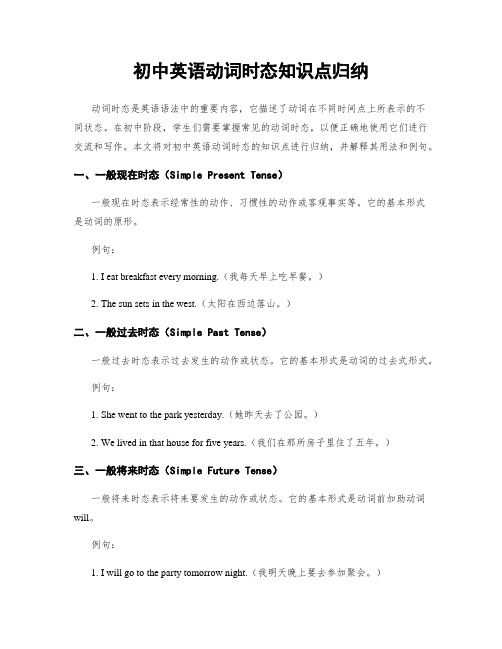
初中英语动词时态知识点归纳动词时态是英语语法中的重要内容,它描述了动词在不同时间点上所表示的不同状态。
在初中阶段,学生们需要掌握常见的动词时态,以便正确地使用它们进行交流和写作。
本文将对初中英语动词时态的知识点进行归纳,并解释其用法和例句。
一、一般现在时态(Simple Present Tense)一般现在时态表示经常性的动作、习惯性的动作或客观事实等。
它的基本形式是动词的原形。
例句:1. I eat breakfast every morning.(我每天早上吃早餐。
)2. The sun sets in the west.(太阳在西边落山。
)二、一般过去时态(Simple Past Tense)一般过去时态表示过去发生的动作或状态。
它的基本形式是动词的过去式形式。
例句:1. She went to the park yesterday.(她昨天去了公园。
)2. We lived in that house for five years.(我们在那所房子里住了五年。
)三、一般将来时态(Simple Future Tense)一般将来时态表示将来要发生的动作或状态。
它的基本形式是动词前加助动词will。
例句:1. I will go to the party tomorrow night.(我明天晚上要去参加聚会。
)2. The train will arrive at 10:00 AM.(火车将在上午10点到达。
)四、现在进行时态(Present Continuous Tense)现在进行时态表示正在进行的动作。
它的基本形式是be动词(am, is, are)加动词的现在分词形式(-ing结尾)。
例句:1. He is playing soccer in the park.(他正在公园里踢足球。
)2. They are studying for the exam.(他们正在为考试而学习。
)五、过去进行时态(Past Continuous Tense)过去进行时态表示过去某一时刻正在进行的动作。
初中英语动词时态总结

初中英语动词时态总结初中英语动词时态总结动词时态是表示动作发生的时间的形式。
在英语中,动词时态分为四种基本时态:一般现在时、一般过去时、一般将来时和现在进行时。
此外,还有一些复合时态,如现在完成时、过去完成时和将来完成时等。
以下是对这些时态的详细总结。
一、一般现在时一般现在时表示经常性或习惯性的动作、客观真理、现实状态或普遍现象。
一般现在时的结构是主语+动词的原形(第三人称单数要加-s)。
1. 经常性或习惯性的动作:She often goes to the park on weekends.2. 客观真理:The earth revolves around the sun.3. 现实状态:I feel tired today.4. 普遍现象:People like to eat chocolate.二、一般过去时一般过去时表示在过去某个时间发生的动作或存在的状态。
一般过去时的结构是主语+动词的过去式。
1. 过去某个时间的动作:They went to the beach last summer.2. 过去存在的状态:She was a teacher before retirement.三、一般将来时一般将来时表示将要发生的动作或存在的状态。
一般将来时的结构是主语+will/won't+动词的原形。
1. 将要发生的动作:I will finish my homework tonight.2. 将要存在的状态:He will be a doctor in the future.四、现在进行时现在进行时表示正在进行的动作。
现在进行时的结构是主语+am/is/are+动词的ing形式。
1. 正在进行的动作:She is reading a book now.2. 临时状态:I am staying with my friends this week.五、现在完成时现在完成时表示过去发生的动作对现在造成的影响或结果。
初三知识点总结动词时态
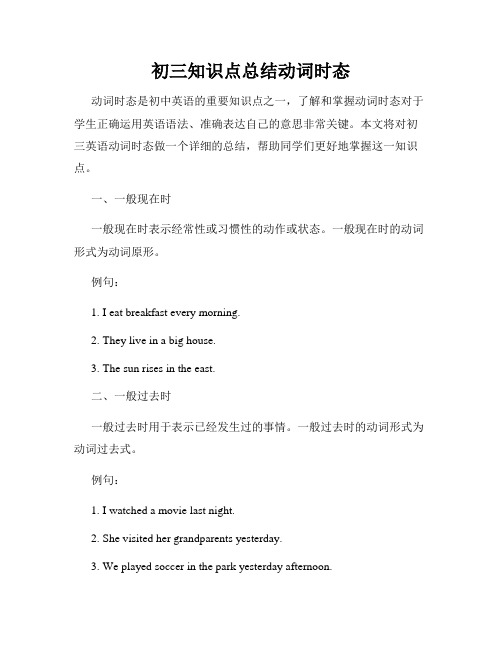
初三知识点总结动词时态动词时态是初中英语的重要知识点之一,了解和掌握动词时态对于学生正确运用英语语法、准确表达自己的意思非常关键。
本文将对初三英语动词时态做一个详细的总结,帮助同学们更好地掌握这一知识点。
一、一般现在时一般现在时表示经常性或习惯性的动作或状态。
一般现在时的动词形式为动词原形。
例句:1. I eat breakfast every morning.2. They live in a big house.3. The sun rises in the east.二、一般过去时一般过去时用于表示已经发生过的事情。
一般过去时的动词形式为动词过去式。
例句:1. I watched a movie last night.2. She visited her grandparents yesterday.3. We played soccer in the park yesterday afternoon.三、一般将来时一般将来时表示将要发生的动作或存在的状态。
一般将来时的动词形式为“will + 动词原形”。
例句:1. I will go to the beach tomorrow.2. They will visit their friends next week.3. She will study hard for the exam.四、现在进行时现在进行时表示现在正在进行的动作。
现在进行时的动词形式为“be + 动词-ing”。
例句:1. He is playing basketball in the park.2. We are studying English at the moment.3. They are watching a movie right now.五、过去进行时过去进行时表示过去某一时间段内正在进行的动作。
过去进行时的动词形式为“was / were + 动词-ing”。
初中英语语法知识点整理总结-动词

初中英语语法知识点整理总结-动词动词是句子的中心词,用来表示人或物的动作、状态、变化等。
掌握动词的正确使用对于研究英语语法至关重要。
以下是初中英语动词知识点的整理总结:1. 动词的分类- 及物动词:表示动作的动词,需要带宾语才能构成完整的意义。
例如:read(读),eat(吃)。
- 不及物动词:表示动作的动词,不需要带宾语。
例如:run (跑),sleep(睡觉)。
- 连系动词:表示状态的动词,连接主语和表语,没有实际意义。
例如:be(是),seem(似乎)。
2. 动词的时态- 现在时:表示目前正在进行的动作或状态。
例如:I read a book.(我正在读一本书。
)- 过去时:表示过去发生的动作或状态。
例如:She ate an apple yesterday.(她昨天吃了一个苹果。
)- 将来时:表示将来要发生的动作或状态。
例如:They will go to the zoo tomorrow.(他们明天会去动物园。
)3. 动词的语态- 主动语态:表示主语是动作的执行者。
例如:Jim cleans the room.(吉姆打扫房间。
)- 被动语态:表示主语是动作的承受者。
例如:The room is cleaned by Jim.(房间被吉姆打扫了。
)4. 动词的情态- can:表示能力或许可。
例如:She can swim.(她会游泳。
)- must:表示必须。
例如:You must finish your homework.(你必须完成你的作业。
)- should:表示建议或义务。
例如:You should help others.(你应该帮助别人。
)以上是初中英语动词的一些基本知识点,希望对你的研究有所帮助。
初三英语时态汇总(一般现在时、一般将来时、一般过去时和现在进行时、过去进行时、现在完成时、过去完成时)
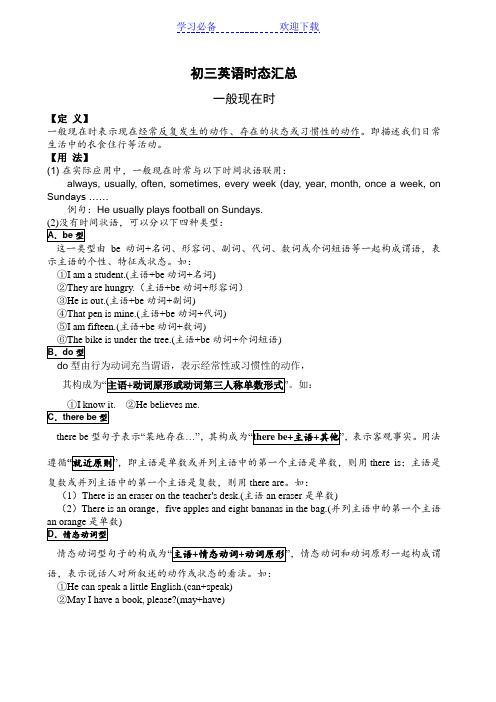
初三英语时态汇总一般现在时【定义】一般现在时表示现在经常反复发生的动作、存在的状态或习惯性的动作。
即描述我们日常生活中的衣食住行等活动。
【用法】(1) 在实际应用中,一般现在时常与以下时间状语联用:always, usually, often, sometimes, every week (day, year, month, once a week, on Sundays ……例句:He usually plays football on Sundays.be动词+名词、形容词、副词、代词、数词或介词短语等一起构成谓语,表示主语的个性、特征或状态。
如:①I am a student.(主语+be动词+名词)②They are hungry.(主语+be动词+形容词)③He is out.(主语+be动词+副词)④That pen is mine.(主语+be动词+代词)⑤I am fifteen.(主语+be动词+数词)主语+be动词+介词短语)其构成为。
如:②He believes me.there be型句子表示“某地存在…”,其构成为,表示客观事实。
用法遵循,即主语是单数或并列主语中的第一个主语是单数,则用there is;主语是复数或并列主语中的第一个主语是复数,则用there are。
如:(1)There is an eraser on the teacher's desk.(主语an eraser是单数)(2)There is an orange,five apples and eight bananas in the bag.(并列主语中的第一个主语)情态动词型句子的构成为,情态动词和动词原形一起构成谓语,表示说话人对所叙述的动作或状态的看法。
如:①He can speak a little English.(can+speak)②May I have a book, please?(may+have)【练习】2. __________(be) Tom and Sam in the same class?3. Your school life __________(be) very interesting.4. There __________(be) a pen, two rulers and some books on the desk.5. The boys __________(be) very friendly to me.6. Maria __________(be not) from the U.S.A.7. __________(be) there any trees and a pool in the yard?8. I want to __________(be) a teacher.9. Mr. Wang can’t __________(be) at home, because the lights are off.10. Don’t __________(be) late for school again.二、用所给词的适当形式填空。
- 1、下载文档前请自行甄别文档内容的完整性,平台不提供额外的编辑、内容补充、找答案等附加服务。
- 2、"仅部分预览"的文档,不可在线预览部分如存在完整性等问题,可反馈申请退款(可完整预览的文档不适用该条件!)。
- 3、如文档侵犯您的权益,请联系客服反馈,我们会尽快为您处理(人工客服工作时间:9:00-18:30)。
一、选择题1.I like this dress very much. It soft and smooth.A.feels B.touches C.is felt D.is touched 2.Mr Hua ________ to Japan. He’ll come back in two weeks.A.goes B.went C.has gone D.will go 3.Becky took a photo of her friends while they _________ computer games.A.play B.are playing C.were playing D.have played 4.—Rose, can you give me a hand?—Just a minute. I ______ the followers.A.am watering B.have wateredC.watered D.water5.Miss Brown, we ______ cleaning our classroom. Can we go home now?A.finish B.finishingC.are finished D.have finished6.— Where can I find Jack?— He __________ to the post office.A.goes B.has gone C.has been D.will go 7.— How about going for a drive, Mike?— One moment, please! I __________ cleaning our room soon.A.will finish B.have finished C.finish D.finishes 8.—Mom, can you teach me how to pronounce the words?—Wait a minute. I ________.A.am cooking B.cookC.cooked D.will cook9.— Look at my new watch.—Well, it’s so cool! When and where________you buy it?A.Do B.will C.did D.Are10.I________ cleaning my room.It’s clean now.A.have finished B.finished C.finish D.will finish 11.Boys and girls, there ________an English speech competition in two weeks.A.will have B.has C.is going to be D.are going to be 12.—How long have you________?—For 10 years, we got married in 2005.A.married B.got married C.been married D.were married 13.It’s 4:00 p.m. The students _____ in the pool.A.swim B.swam C.swims D.are swimming14.—I can’t stand such loud music!— Sorry, I __________ it off.A.have turned B.turn C.turned D.will turn15.My mother will be very angry with me when she out where I have been.A.finds B.found C.will find D.has found 16.Which of the following sentences is correct?A.He came in and sat down.B.We all like <Harry Potter>.C.When we met. He didn't say hello.D.We went out, headed for the bus stop.17.—I called you at three yesterday afternoon, but you weren’t in.—I ________ a meeting at that time.A.had B.was having C.have had D.would have 18.—Have you written a litter to your brother?—Yes, I have. I________one last Sunday.A.was writing B.wrote C.have written19.My mother when I got home yesterday.A.will cook B.cooks C.has cooked D.was cooking20.--Look! Someone the classroom.--Well,it wasn't me. I didn't do it.A.is cleaning B.was cleaning C.has cleaned D.will clean21.—I can’t find Peter. Where is he?— He ______ tea in the living room.A.drinks B.drinking C.is drinking D.drink22.The film Operation Red Sea_____a lot of praise since its first show months ago.A.wins B.win C.will win D.has won23.It only __________ him 20 minutes __________ to his office every day.A.takes;to drive B.take;drive C.takes;drive24.— Have you ever been anywhere for a trip?— A trip? I ________ away from my hometown even once.A.went B.have gone C.have been D.have never been 25.Dick __________ in America, but he has been ___________ Chinese food since he moved to China.A.used to live; used to eatingB.is used to live; used to eatC.is used to live; used to eatingD.used to living; used to eat【参考答案】***试卷处理标记,请不要删除1.A解析:A【解析】【分析】【详解】句意:我非常喜欢这条裙子。
它摸上去柔软和光滑。
考查感官动词。
feels感觉,摸起来,一般现在时三单形式;touches触摸,一般现在时三单形式;is felt表示被动语态,被感觉;is touched被动语态,被触摸。
根据题干中“It ____ soft and smooth.”可知句子是主系表结构,此处用感官动词feel作系动词,排除BD;感官动词无被动语态,排除C。
故选A。
2.C解析:C【解析】【分析】【详解】句意:Mr Hua 去了日本,他将在两周以后回来。
考查动词时态。
goes去,第三人称单数;went去,过去式; has gone已经去,现在完成时;will go将去,一般将来时。
根据下文“He’ll come back in two weeks.”可知,此处是去了日本,用have/has gone to…去了……。
根据题意,故选C。
3.C解析:C【解析】试题分析:句意:Becky给她的朋友照了一张相当他们正玩电脑游戏时。
when 引导的从句表示主从句的动作同时发生,从句用进行时,或从句的动作发生在主句动作之前,主句用将来时,从句用一般现在时。
while 引导的从句表示“当……过程中”,主句动作在从句动作发生的过程中发生,从句一般用进行时。
该句强调在玩电脑的过程中照的相。
事情发生在过去,故用过去进行时态,所以选C.考点:考查动词的时态。
4.A解析:A【解析】【分析】【详解】句意:——Rose,你能帮我一下吗?——等一下,我正在浇花。
考查现在进行时。
根据语境:“Rose,你能帮我一下吗?”“等一下,我______花。
”可推测是正在浇花,所以用现在进行时。
故答案为A。
5.D【解析】试题分析:句意:布朗夫人,我们已经打扫完了教室,我们现在可以回家了吗?finish完成;finishing现在分词形式;are finished被完成,被动语态形式;have finished现在完成时,已经完成。
根据句意可知,我们已经打扫完了,强调动作已经完成。
故应选D。
【考点定位】:考查动词时态。
6.B解析:B【解析】【分析】【详解】句意:——我在哪里可以找到杰克?——他已经去邮局了。
考查动词时态。
goes一般现在时,表示“去”;has gone 现在完成时,表示“某人去了某地,现在还没有回来”;has been 现在完成时,表示“某人曾经去过某地,此时已回来”;will go一般将来时,表示“将要去”。
根据句意可知,杰克已经去了邮局,不在这里,还没有返回。
故have/has gone to符合题意。
故选B。
7.A解析:A【解析】【分析】【详解】句意:——迈克,开车出去兜兜风怎么样? ——请等一会,我会很快打扫完我们的房间。
考查动词时态。
本句中有时间状语soon,表示“很快,不久”,故本句时态为一般将来时。
will finish一般将来时;have finished现在完成时;finish一般现在时;finishes一般现在时,主语为第三人称单数。
故选A。
8.A解析:A【解析】【分析】【详解】句意:——妈妈,你能教我读这些单词吗?——等会儿。
我正在做饭。
考查动词的时态,am cooking现在进行时;cook动词原形;cooked过去式;will cook一般将来时。
